Counter Offer Salary Letter Sample
[Your Name]
[Your Address]
[City, State, ZIP Code]
[Email Address]
[Phone Number]
[Today's Date]
[Employer's Name]
[Company Name]
[Company Address]
[City, State, ZIP Code]
Dear [Employer's Name],
I hope this letter finds you well. I want to express my gratitude for offering me the [Job Title] position at [Company Name]. I am thrilled about the opportunity to contribute my skills and expertise to the success of your organization.
Upon careful consideration and reflection on the terms of the offer, I would like to discuss the salary component. While I am genuinely excited about joining [Company Name], I believe my skills and experience align well with the responsibilities of the role, which justifies a slightly higher compensation to reflect the value I can bring to the position and the company as a whole.
After conducting thorough research on the current market salary rates for similar positions in the industry and considering my qualifications, I would like to propose a counter offer of [your desired salary] per [year/month]. I believe this adjustment is reasonable and competitive given my experience, skills, and the current market trends.
I want to emphasize my commitment to contributing to the success of [Company Name] and delivering exceptional results in my role. I am confident that with this adjustment to the salary, I will be even more motivated and dedicated to exceeding expectations.
I am open to further discussion and negotiation to reach a mutually beneficial agreement. Apart from the salary, all other aspects of the offer, such as benefits, vacation time, and any other terms, are acceptable to me.
Thank you once again for considering me for this role and for your understanding regarding my counter offer. I am looking forward to joining the [Company Name] team and making a significant impact on the company's growth and success.
Please feel free to contact me at [Your Phone Number] or [Your Email Address] to discuss this further. I am available at your convenience.
Thank you for your time and consideration.
Sincerely,
[Your Name]
[Your Signature if printed]
Professional Counter Offer Email for Higher Base Salary
Subject: Counter Offer - [Position Title] Role
Dear [Hiring Manager's Name],
Thank you for extending the offer for the [Position Title] position at [Company Name]. I am excited about the opportunity to contribute to your team and am eager to move forward.
After careful consideration of the compensation package, I would like to respectfully counter the base salary offer. Based on my research of industry standards, my relevant experience of [X years] in [specific field], and the value I can bring to this role, I believe a salary of $[desired amount] would be more appropriate.
This adjustment would reflect my proven track record in [specific achievements], my expertise in [relevant skills], and the current market rate for similar positions in [location/industry]. I am confident that my contributions will exceed this investment.
I remain very interested in joining [Company Name] and hope we can reach a mutually beneficial agreement. I am open to discussing this further at your convenience.
Thank you for your consideration.
Best regards,
[Your Name]
[Your Phone Number]
[Your Email]
Casual Counter Offer Email for Total Compensation Package
Subject: Let's Talk Numbers - [Position] Offer
Hi [Hiring Manager's Name],
Thanks so much for the offer! I'm really excited about joining the [Company Name] team and getting started on [specific project/goal mentioned in interviews].
I've been thinking about the compensation package, and I was hoping we could adjust a few things to better align with my expectations. Here's what I'm thinking:
Base salary: $[amount] (currently offered $[current amount])
Additional vacation days: [number] (for better work-life balance)
Professional development budget: $[amount] annually
The role seems like a perfect fit for my background in [relevant experience], and I know I can make a real impact from day one. These adjustments would help me feel confident that the package reflects the value I'll bring.
Would you be open to discussing these points? I'm flexible and definitely want to make this work.
Looking forward to hearing from you!
Best,
[Your Name]
Formal Counter Offer Letter for Executive Position
Subject: Response to Executive Offer - [Position Title]
Dear [Board Member/CEO Name],
I am honored by your offer to join [Company Name] as [Executive Position]. The vision you shared for the company's future and the strategic challenges ahead align perfectly with my career aspirations and expertise.
After thorough consideration of the comprehensive offer, I would like to propose the following modifications to better reflect the scope of responsibilities and industry benchmarks for similar executive roles:
Base Salary: $[amount] (increase from $[current offer])
Equity Participation: [percentage]% equity stake with [vesting schedule]
Performance Bonus: Target of [percentage]% of base salary tied to [specific metrics]
Severance Package: [terms] months of full compensation
Relocation Assistance: $[amount] for family relocation expenses
These adjustments acknowledge the significant P&L responsibility, the turnaround nature of the role, and the industry expertise required. My track record of [specific achievements] demonstrates the ROI you can expect from this investment.
I am committed to delivering exceptional results and believe these terms create the right framework for mutual success. I welcome the opportunity to discuss these points further.
Respectfully,
[Your Full Name]
[Your Title]
[Date]
Creative Counter Offer Email for Startup Role
Subject: Optimizing Our Partnership - Counter Proposal
Hey [Founder's Name],
First off, I'm genuinely stoked about the possibility of joining [Startup Name]! The product roadmap you showed me has me already brainstorming ways to accelerate growth and user acquisition.
Here's my thinking on the comp structure - let's make this a true partnership that scales with our success:
Base: $[amount] (modest increase to cover living expenses)
Equity: [percentage]% with early exercise options (I want skin in the game!)
Flexible PTO (because creativity needs recharge time)
$[amount] annual learning stipend (conferences, courses, etc.)
Remote work flexibility (2-3 days WFH)
I know cash is tight in the early stages, but I believe the equity upside and flexibility package creates a win-win. Plus, my experience scaling [previous company/project] from [starting point] to [end result] shows I'm betting on us for the long haul.
What do you think? Ready to build something amazing together?
Cheers,
[Your Name]
P.S. I already have three ideas for improving the onboarding funnel!
Professional Counter Offer Email After Internal Promotion
Subject: Promotion Offer Discussion - [New Position Title]
Dear [Manager's Name],
Thank you for offering me the [New Position Title] role. I'm thrilled about the opportunity to take on greater responsibilities and continue growing with [Company Name].
While I appreciate the promotion, I'd like to discuss the compensation adjustment to ensure it reflects the expanded scope of this role. Based on my research and the additional responsibilities including [specific duties], I believe a salary of $[amount] would be more appropriate.
Consider my contributions over the past [time period]:
- [Specific achievement with quantifiable result]
- [Another achievement with impact]
- [Third achievement showing value added]
The new role adds [list key new responsibilities], which typically commands a [percentage]% increase in similar positions. I've also taken on additional training in [relevant skills] to prepare for this transition.
I'm confident in my ability to excel in this expanded role and would appreciate your consideration of this adjustment. Can we schedule time this week to discuss?
Thank you for your continued support.
Best regards,
[Your Name]
Heartfelt Counter Offer Email for Career Change Role
Subject: Thank You and Salary Discussion - [Position Title]
Dear [Hiring Manager's Name],
I want to express my sincere gratitude for believing in my potential and offering me the [Position Title] role at [Company Name]. This opportunity represents exactly the career pivot I've been working toward, and I'm genuinely excited about contributing to your mission.
I understand that career changers often start at adjusted compensation levels, and I appreciate your willingness to take a chance on my transferable skills. However, I'd like to propose a salary of $[amount], which I believe reflects the unique value I bring from my [previous industry] background.
My experience in [previous field] has given me skills that directly translate to this role:
- [Transferable skill 1] from managing [previous responsibility]
- [Transferable skill 2] from [previous achievement]
- [Transferable skill 3] that will help with [specific job duty]
I'm committed to proving that this investment will pay dividends quickly. Would you consider a performance review at [90 days/6 months] to reassess compensation based on my contributions?
Thank you for taking the time to consider this request. I'm ready to bring passion and dedication to this new chapter.
Warmly,
[Your Name]
Quick Counter Offer Email for Freelance-to-Full-Time Transition
Subject: Full-Time Offer - Quick Counter
Hi [Manager's Name],
Thanks for the full-time offer! Excited to make it official and dive deeper into [company projects].
Quick counter on the salary: $[amount] instead of $[offered amount].
My rationale: As a freelancer, I was billing [rate] for similar work, and going full-time means giving up other clients and project variety. The increase accounts for benefits and exclusivity.
Plus, you already know my work quality and speed from our [project duration] together - no learning curve needed!
Let me know your thoughts. Ready to make this transition seamless.
Best,
[Your Name]
Serious Counter Offer Email for Competitive Market Role
Subject: Salary Negotiation - [Position Title] Offer
Dear [Hiring Manager's Name],
Thank you for the offer for the [Position Title] position. I'm impressed by [Company Name]'s growth trajectory and eager to contribute to your continued success.
I must address the compensation component of the offer. The proposed salary of $[offered amount] falls below current market rates for this role. Based on comprehensive research using [salary websites/industry reports], the market range for similar positions in [location] is $[range].
Additionally, I have received competing offers that value my skills at $[competing offer amount]. While compensation isn't my only consideration, I need to ensure the package reflects my market value and supports my financial obligations.
I would like to propose a salary of $[desired amount], which represents the median market rate and acknowledges my [specific qualifications/experience]. This investment aligns with industry standards and positions both of us for a successful long-term partnership.
I hope we can reach an agreement that works for everyone. I'm available to discuss this further at your earliest convenience.
Professionally,
[Your Name]
What is a Counter Offer Salary Letter and Why Do You Need One
A counter offer salary letter is a formal or semi-formal communication sent to an employer in response to a job offer, requesting modifications to the proposed compensation package. This document serves as a negotiation tool that allows candidates to advocate for better terms while maintaining professionalism and interest in the position.
The primary purposes include:
- Bridging the gap between employer budget and candidate expectations
- Demonstrating your understanding of market value and self-worth
- Opening dialogue for mutually beneficial negotiations
- Setting the foundation for your future compensation trajectory
- Showing confidence and business acumen to potential employers
When to Send a Counter Offer Salary Letter
Counter offer letters are appropriate in several scenarios:
- Initial job offers with below-market compensation
- Internal promotions with insufficient salary adjustments
- Career transitions where your transferable skills warrant higher pay
- Competing offers that leverage your negotiating position
- Equity-heavy startups where cash compensation is negotiable
- Executive positions where comprehensive packages require fine-tuning
- Freelance-to-permanent transitions requiring rate adjustments
- Geographic relocations with cost-of-living considerations
- Industry changes where your unique background adds premium value
- Performance-based roles where you can justify higher base compensation
Who Should Send Counter Offer Letters
Counter offer letters are most effective when sent by:
- Experienced professionals with proven track records
- Candidates with specialized skills in high-demand fields
- Job seekers who have thoroughly researched market rates
- Individuals with competing offers or strong leverage
- Internal candidates being promoted with expanded responsibilities
- Career changers bringing valuable transferable skills
- Executives and senior-level professionals
- Freelancers or contractors transitioning to full-time roles
- Professionals relocating for positions
- High-performers with quantifiable achievements
To Whom Should You Address Counter Offer Letters
Your counter offer should be directed to:
- The hiring manager who extended the original offer
- HR representatives handling compensation negotiations
- Department heads with budget authority
- Founders or C-level executives for senior positions
- Direct supervisors for internal promotions
- Recruiting managers coordinating the hiring process
- Anyone specifically designated as the salary negotiation contact
Ensure you're addressing the decision-maker or someone with actual authority to approve compensation changes, not just administrative coordinators.
Requirements and Prerequisites Before Sending
Before drafting your counter offer:
- Research industry salary benchmarks using multiple reliable sources
- Document your relevant experience, achievements, and unique qualifications
- Understand the company's financial situation and compensation philosophy
- Identify your minimum acceptable terms and ideal outcomes
- Gather competing offers or market data to support your request
- Review the complete compensation package beyond base salary
- Assess your negotiating leverage and market demand for your skills
- Prepare justifications for each requested adjustment
- Consider timing relative to company budget cycles and hiring urgency
- Evaluate the potential risks and rewards of negotiating
How to Structure and Send Your Counter Offer
The process involves several key steps:
- Begin with gratitude and enthusiasm for the opportunity
- Clearly state your counter proposal with specific numbers
- Provide compelling justification based on market data and your value
- Maintain a collaborative tone focused on mutual benefit
- Include supporting evidence like salary research or competing offers
- Propose alternative compensation structures if appropriate
- Set clear expectations for next steps and timeline
- Choose the right communication method (email for most situations)
- Time your response appropriately (within 2-5 business days)
- Keep documentation of all negotiations for reference
Formatting Guidelines and Best Practices
Effective counter offer letters should follow these guidelines:
- Length: Keep it concise, typically 200-400 words for email, longer for formal letters
- Tone: Professional but personable, confident without being demanding
- Structure: Clear subject line, warm opening, specific request, justification, collaborative closing
- Format: Email for most modern communications, formal letter for executive positions
- Timing: Send during business hours, avoid Fridays or holiday periods
- Supporting materials: Attach salary research or achievement summaries if relevant
- Follow-up: Indicate your availability for discussion and preferred response timeline
- Proofreading: Ensure perfect grammar, spelling, and professional presentation
Common Mistakes to Avoid
Avoid these negotiation pitfalls:
- Making demands instead of collaborative requests
- Focusing solely on personal financial needs rather than market value
- Negotiating multiple times without new information or circumstances
- Providing ultimatums or threatening to walk away prematurely
- Comparing yourself to colleagues or making internal salary discussions public
- Negotiating via phone without written follow-up documentation
- Requesting adjustments without supporting data or justification
- Apologizing excessively or undermining your own position
- Negotiating too early in the process before receiving a formal offer
- Ignoring non-salary benefits that may have significant value
- Being inflexible about alternative compensation structures
Follow-up Actions After Sending
After submitting your counter offer:
- Wait for a response before sending additional communications
- Be prepared to provide additional justification if requested
- Remain flexible about alternative compensation structures
- Document all verbal discussions with written summaries
- Set realistic expectations for response timeline (typically 3-7 business days)
- Prepare for potential counter-counters or partial acceptances
- Consider your next steps if the counter offer is declined
- Maintain professionalism regardless of the outcome
- Thank the employer for their consideration throughout the process
- Be ready to make a final decision once negotiations conclude
Advantages and Disadvantages of Counter Offers
Advantages:
- Potential for significantly higher compensation throughout your tenure
- Demonstrates confidence and business acumen
- Sets precedent for future salary negotiations
- May improve overall compensation package beyond just salary
- Shows you understand your market value
- Can strengthen your position and respect within the organization
Disadvantages:
- Risk of offer withdrawal if handled poorly
- May create perception of being difficult or money-focused
- Could strain relationships before starting the role
- Might set unrealistic expectations for future increases
- Time investment in research and negotiation process
- Potential for unsuccessful negotiation leading to awkward acceptance
Essential Elements and Structure
Every counter offer letter should include:
- Subject line: Clear, professional reference to the negotiation
- Opening: Gratitude and enthusiasm for the opportunity
- Current offer acknowledgment: Confirmation of what was offered
- Counter proposal: Specific, quantified requests
- Justification: Market data, experience, and value proposition
- Flexibility statement: Openness to discussion and alternatives
- Next steps: Clear expectations for follow-up
- Professional closing: Warm, confident conclusion
- Contact information: Multiple ways to reach you for quick response
- Supporting documentation: Relevant attachments or references when appropriate

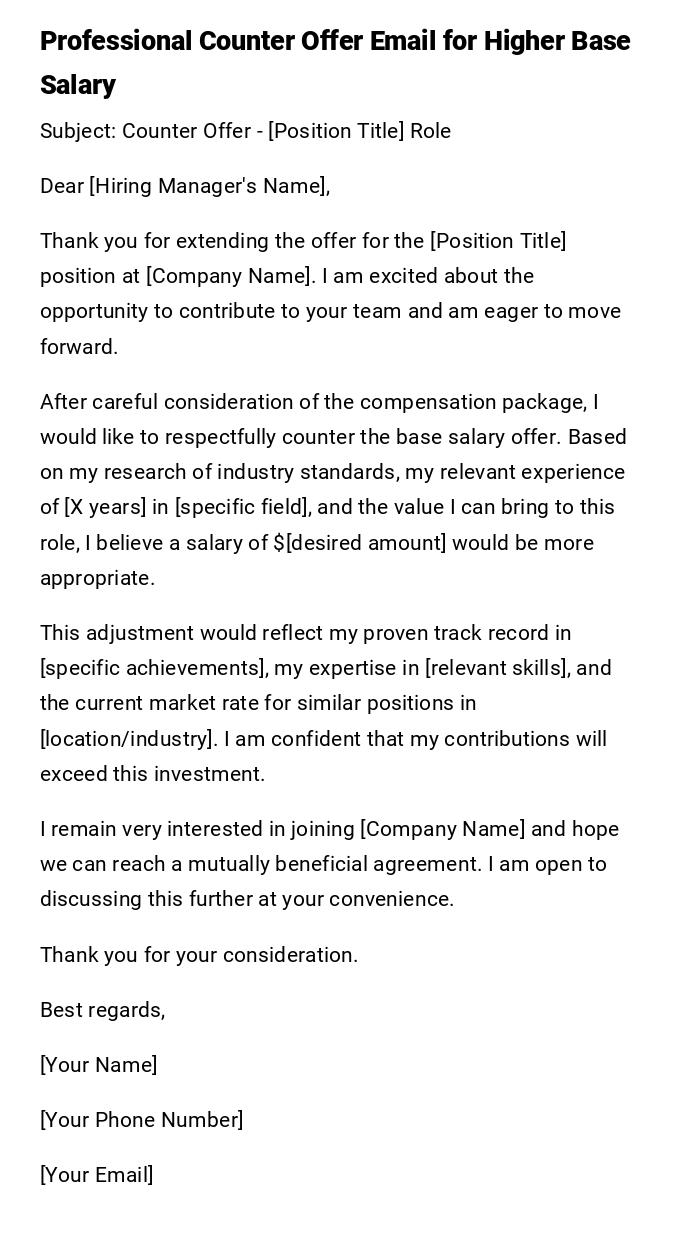
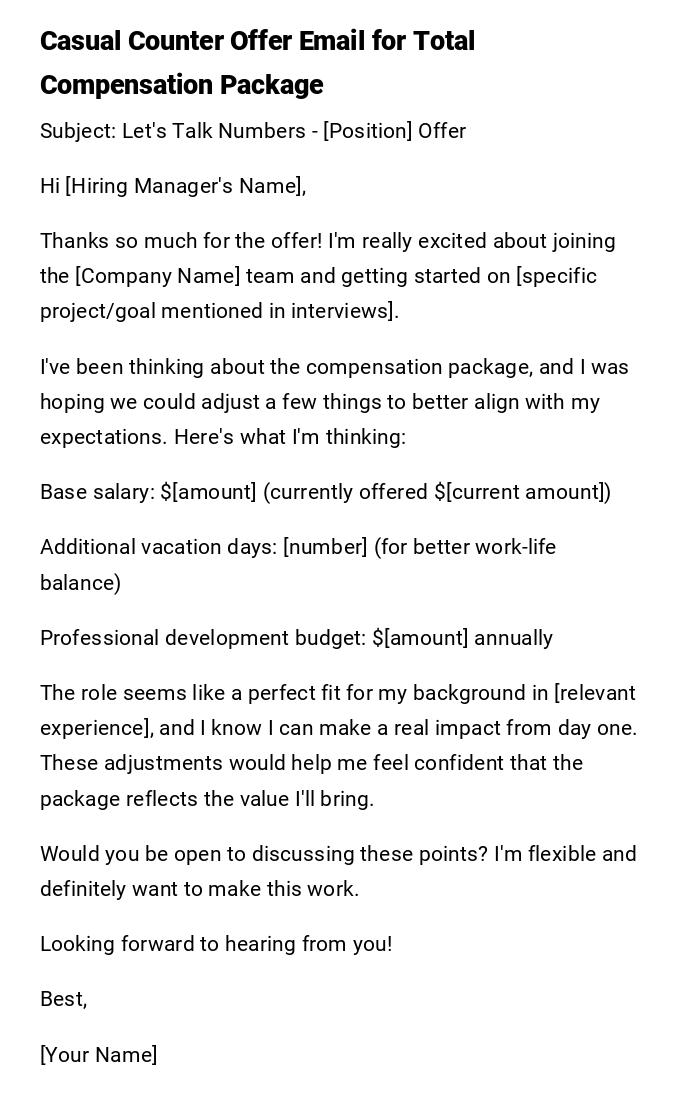
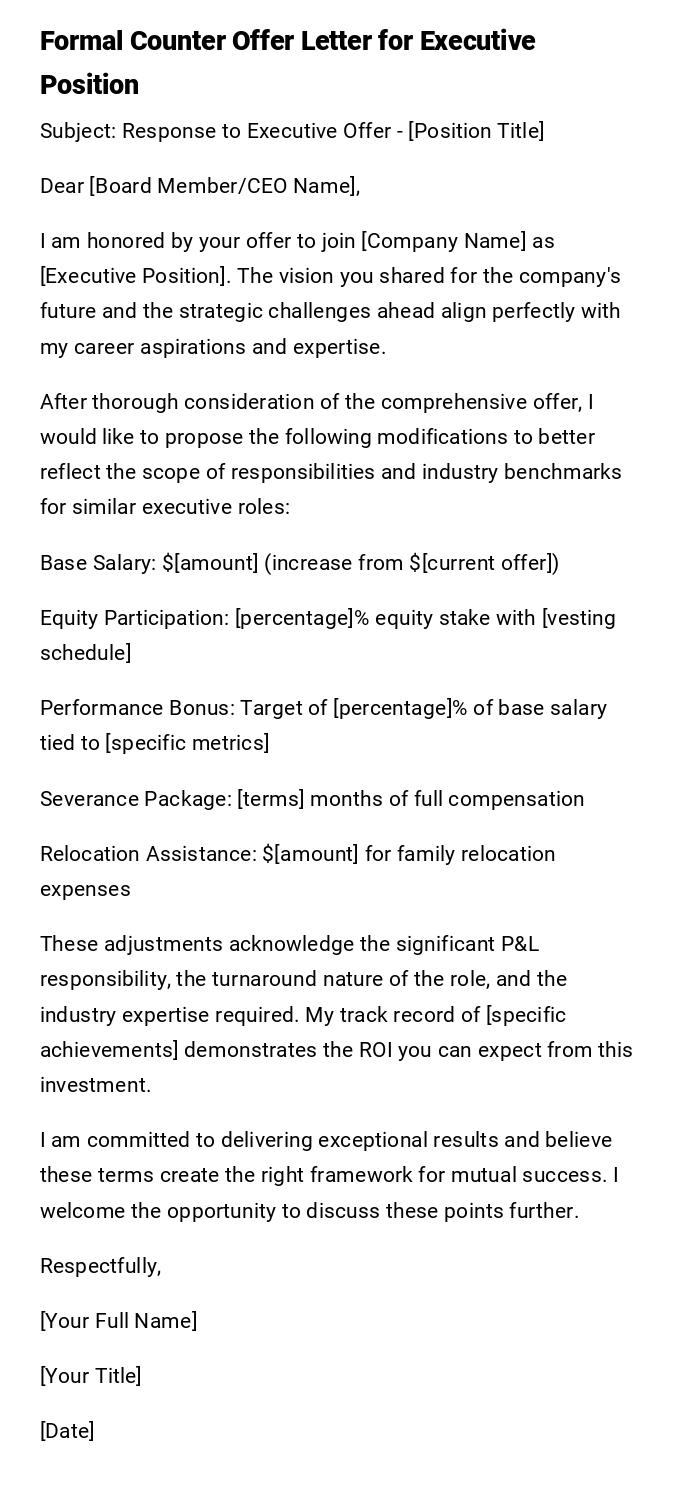
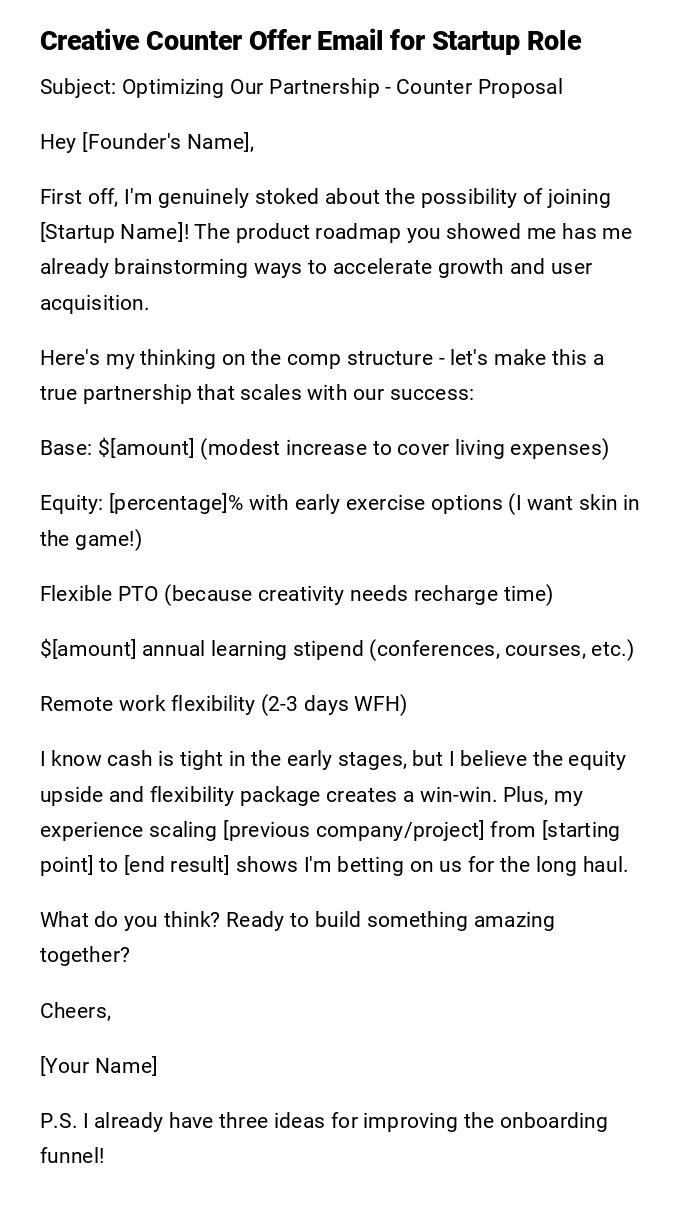
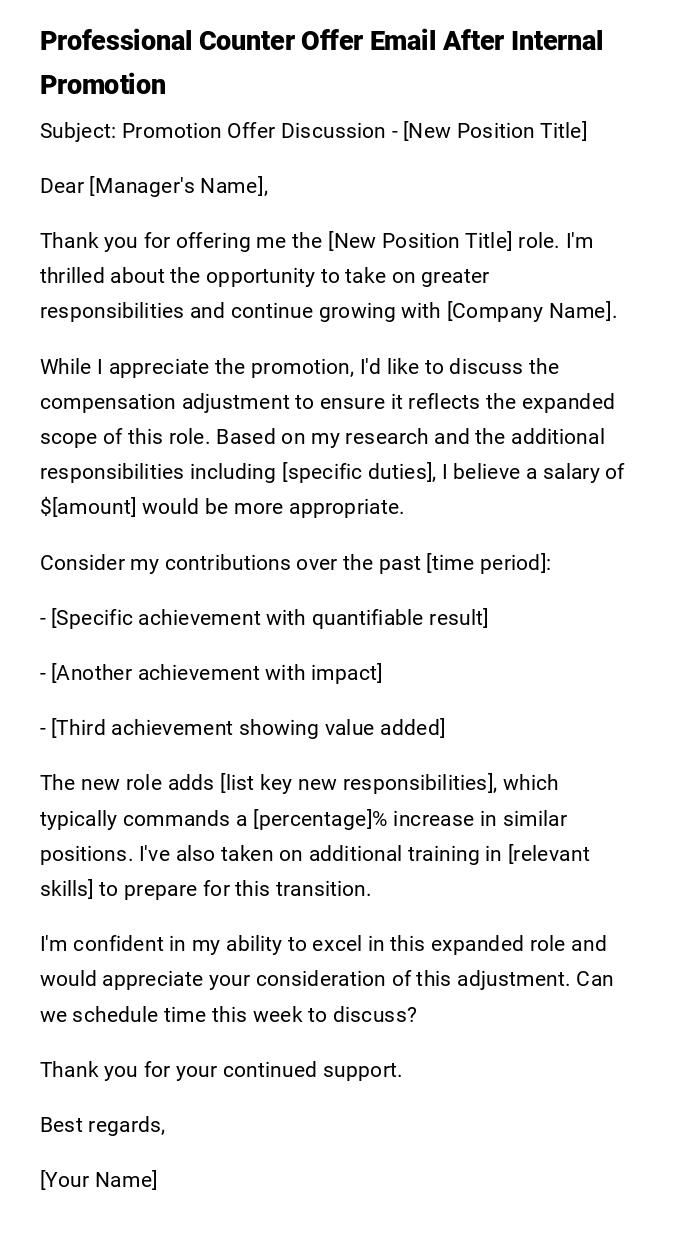
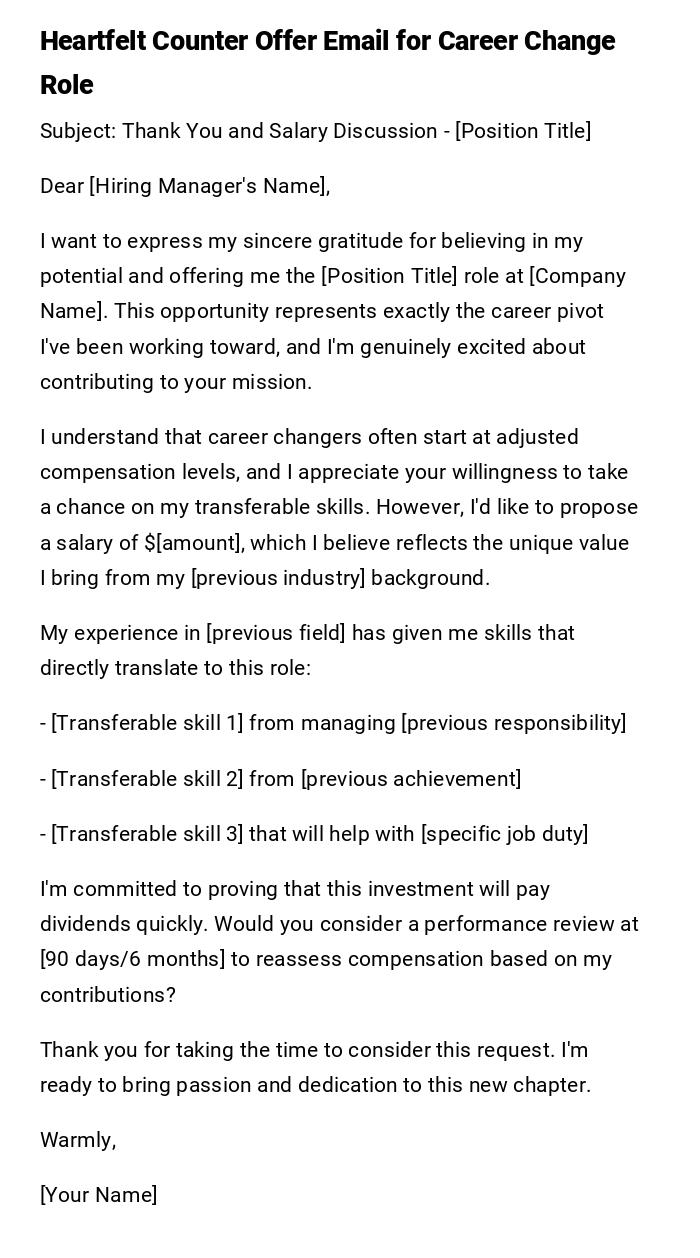
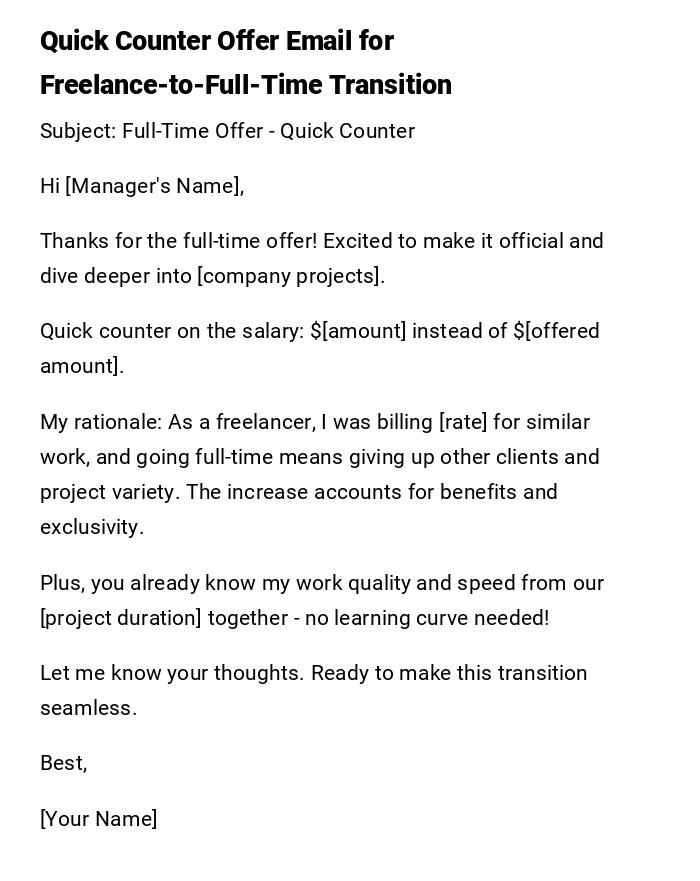
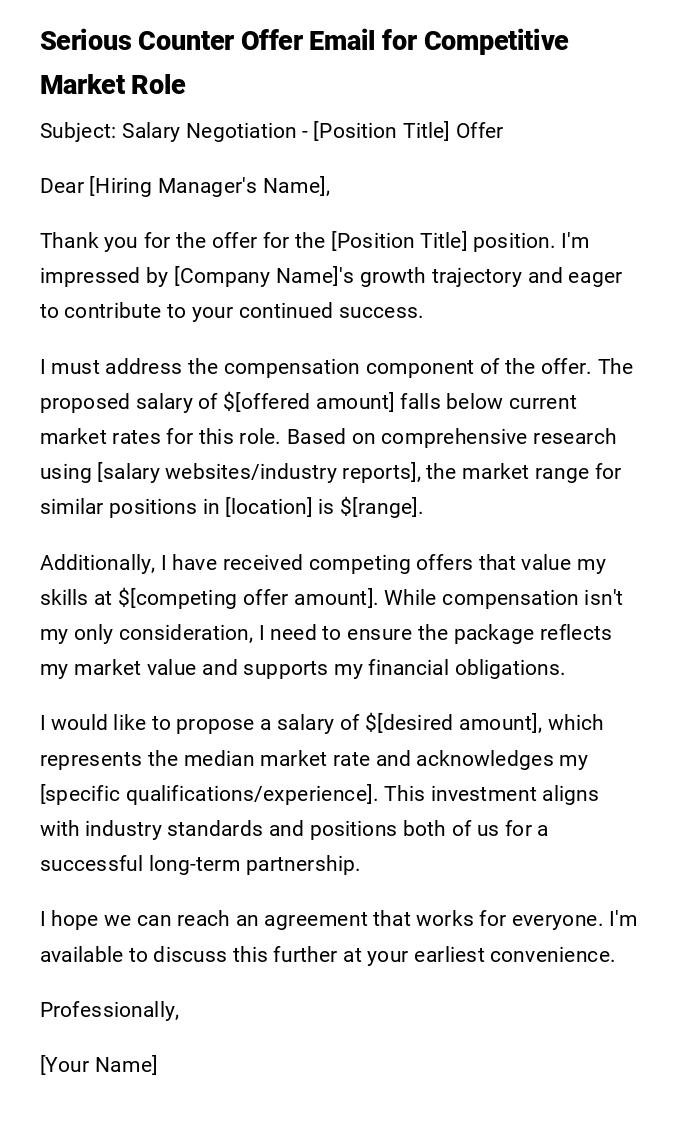

 Download Word Doc
Download Word Doc
 Download PDF
Download PDF